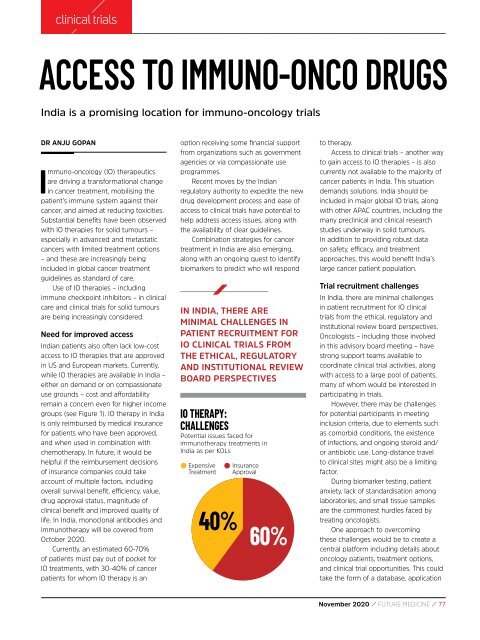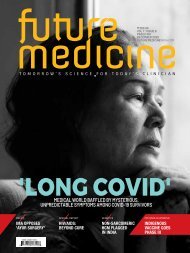FM November2020 Digital P
Create successful ePaper yourself
Turn your PDF publications into a flip-book with our unique Google optimized e-Paper software.
clinical trials<br />
ACCESS TO IMMUNO-ONCO DRUGS<br />
India is a promising location for immuno-oncology trials<br />
DR ANJU GOPAN<br />
Immuno-oncology (IO) therapeutics<br />
are driving a transformational change<br />
in cancer treatment, mobilising the<br />
patient’s immune system against their<br />
cancer, and aimed at reducing toxicities.<br />
Substantial benefits have been observed<br />
with IO therapies for solid tumours –<br />
especially in advanced and metastatic<br />
cancers with limited treatment options<br />
– and these are increasingly being<br />
included in global cancer treatment<br />
guidelines as standard of care.<br />
Use of IO therapies – including<br />
immune checkpoint inhibitors – in clinical<br />
care and clinical trials for solid tumours<br />
are being increasingly considered.<br />
Need for improved access<br />
Indian patients also often lack low-cost<br />
access to IO therapies that are approved<br />
in US and European markets. Currently,<br />
while IO therapies are available in India –<br />
either on demand or on compassionate<br />
use grounds – cost and affordability<br />
remain a concern even for higher income<br />
groups (see Figure 1). IO therapy in India<br />
is only reimbursed by medical insurance<br />
for patients who have been approved,<br />
and when used in combination with<br />
chemotherapy. In future, it would be<br />
helpful if the reimbursement decisions<br />
of insurance companies could take<br />
account of multiple factors, including<br />
overall survival benefit, efficiency, value,<br />
drug approval status, magnitude of<br />
clinical benefit and improved quality of<br />
life. In India, monoclonal antibodies and<br />
immunotherapy will be covered from<br />
October 2020.<br />
Currently, an estimated 60-70%<br />
of patients must pay out of pocket for<br />
IO treatments, with 30-40% of cancer<br />
patients for whom IO therapy is an<br />
option receiving some financial support<br />
from organizations such as government<br />
agencies or via compassionate use<br />
programmes.<br />
Recent moves by the Indian<br />
regulatory authority to expedite the new<br />
drug development process and ease of<br />
access to clinical trials have potential to<br />
help address access issues, along with<br />
the availability of clear guidelines.<br />
Combination strategies for cancer<br />
treatment in India are also emerging,<br />
along with an ongoing quest to identify<br />
biomarkers to predict who will respond<br />
IN INDIA, THERE ARE<br />
MINIMAL CHALLENGES IN<br />
PATIENT RECRUITMENT FOR<br />
IO CLINICAL TRIALS FROM<br />
THE ETHICAL, REGULATORY<br />
AND INSTITUTIONAL REVIEW<br />
BOARD PERSPECTIVES<br />
IO THERAPY:<br />
CHALLENGES<br />
Potential issues faced for<br />
immunotherapy treatments in<br />
India as per KOLs<br />
Expensive<br />
Treatment<br />
Insurance<br />
Approval<br />
40% 60%<br />
to therapy.<br />
Access to clinical trials – another way<br />
to gain access to IO therapies – is also<br />
currently not available to the majority of<br />
cancer patients in India. This situation<br />
demands solutions. India should be<br />
included in major global IO trials, along<br />
with other APAC countries, including the<br />
many preclinical and clinical research<br />
studies underway in solid tumours.<br />
In addition to providing robust data<br />
on safety, efficacy, and treatment<br />
approaches, this would benefit India’s<br />
large cancer patient population.<br />
Trial recruitment challenges<br />
In India, there are minimal challenges<br />
in patient recruitment for IO clinical<br />
trials from the ethical, regulatory and<br />
institutional review board perspectives.<br />
Oncologists – including those involved<br />
in this advisory board meeting – have<br />
strong support teams available to<br />
coordinate clinical trial activities, along<br />
with access to a large pool of patients,<br />
many of whom would be interested in<br />
participating in trials.<br />
However, there may be challenges<br />
for potential participants in meeting<br />
inclusion criteria, due to elements such<br />
as comorbid conditions, the existence<br />
of infections, and ongoing steroid and/<br />
or antibiotic use. Long-distance travel<br />
to clinical sites might also be a limiting<br />
factor.<br />
During biomarker testing, patient<br />
anxiety, lack of standardisation among<br />
laboratories, and small tissue samples<br />
are the commonest hurdles faced by<br />
treating oncologists.<br />
One approach to overcoming<br />
these challenges would be to create a<br />
central platform including details about<br />
oncology patients, treatment options,<br />
and clinical trial opportunities. This could<br />
take the form of a database, application<br />
November 2020 / FUTURE MEDICINE / 77

















